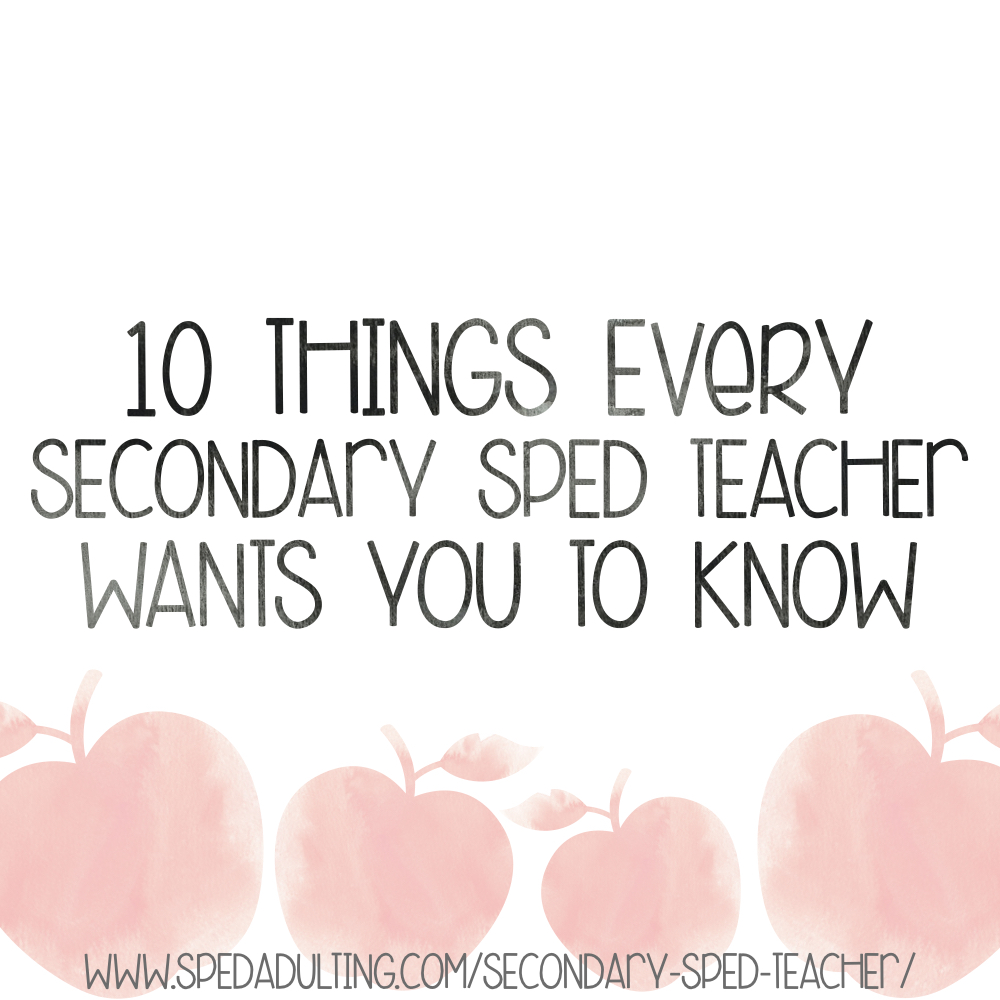Here is a compilation of ten things every middle school, high school and transition sped teacher wishes you knew about them and their students!
1. MODEL THE EXPECTED BEHAVIOR OR TASK
If you find that you are repeating the same direction over and over, try modeling it! Sometimes words just don’t for some people and visuals are so much more helpful. What better way to learn what the expectation is than to watch someone actually do it.
2. JUST BECAUSE THEY HAVE A DISABILITY, DOESN’T MEAN YOU SHOULD LET THEM “JUST GET AWAY WITH IT”
Life is a constant lesson. There’s a difference between being patient and providing accommodations versus just giving a free hall pass. If you just let everything go – “oh it’s okay that happened, he is in special education”, then how are we teaching age-appropriate behaviors and social skills? How are they supposed to learn from their mistakes? Sped teacher – Take the opportunity to explain what went wrong and how to do it correctly next time. These life lesson experiences are extremely important in order for our students to become more independent and decrease the likely hood that they result in a negative experience in the future, like getting fired from a job for doing something wrong that nobody told them was wrong.
3. JUST BECAUSE SOMEONE IS NON-VERBAL, DOESN’T MEAN THEY ARE NON-INTELLECTUAL
As a sped teacher you may have students that do not talk or make eye contact, with fine motor difficulties, but they can read, type, and test at grade level. I’ve had some of the most memorable and intellectual conversations with my non-verbal students – with the use of their device that helps them communicate. The “Don’t judge a book by it’s cover.” quote really holds true in this instance.
4. MY STUDENTS ARE ADULTS OR YOUNG ADULTS, THEY MIGHT ENJOY THINGS THAT ARE NO CONSIDERED “AGE APPROPRIATE”, BUT WHO ARE YOU TO JUDGE?
Everyone is entitled to what makes them happy during their own free time. Yes, I agree, there is a certain time and place for things – such as in the workplace, and I teach my students to focus on their hobbies during their leisure time. If my students want to enjoy their Disney movies at home during their leisure time, it’s not harming anyone is it? Just because it’s not a current pop culture trend for adults, doesn’t mean an adult can’t enjoy it. (Like Hello Kitty- many people don’t know Hello Kitty was originally a Japanese kid cartoon show)
5. READING PICTURES IS STILL READING
Remember learning in school that you are either a visual, aural, verbal, or kinesthetic learner? Well, for many of my students, they are visual learners. Hey sped teacher – provide them with visuals, they can reach for the stars and beyond.
6. MY STUDENTS ARE LEARNING TO BE INDEPENDENT ADULTS, PLEASE DON’T DO EVERYTHING FOR THEM
Cannot stress this enough. Yes our students need help and accommodations, but that doesn’t mean they are not capable. You might think you’re just helping, but all you’re doing is teaching them that someone else will always do it for them.
7. MY STUDENTS ARE ADULTS OR YOUNG ADULTS, PLEASE DON’T TALK TO THEM LIKE THEY ARE BABIES
Treat students their age, not their cognitive level. Not only is it disrespectful & demeaning, but how are we supposed to help them reach independence as an adult if we are treating them like little kids?
8. MY STUDENTS CAN HEAR WHAT YOU ARE SAYING, PLEASE DON’T TALK ABOUT THEM RIGHT IN FRONT OF THEM
Once again, don’t judge a book by its cover. My students can hear you loud and clear. How would you like if someone was talking about you as if you weren’t there?
9. IT’S NOT THAT MY STUDENTS DON’T LIKE YOU OR DON’T WANT TO TALK, YOU JUST HAVE TO BUILD TRUST FIRST
Students with emotional and behavioral problems need to build trust with someone first before opening up. Keep in mind, social skills such as making eye contact or appropriate conversation is hard for them, but we work on it at school on a daily. Be patient and you will get to know an amazing human being.
10. I SWEAR I’M NOT MEAN, I’M JUST LOOKING OUT FOR THE BEST INTERESTS OF MY STUDENTS!
These are things that commonly happen on a daily to my students and as a sped teacher I am here to be their advocate!
You might be interested in this blog post:
Thanks for reading!





